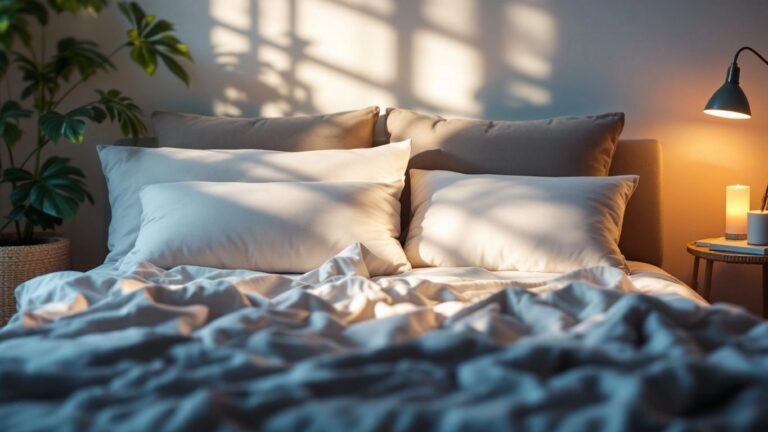Getting a good night’s sleep is essential for our overall health and well-being. However, many people struggle with sleep issues, leading them to seek various sleep aids. In this article, we will explore both natural and prescription options that can help improve sleep quality. Understanding these options can help you find the right solution for your sleep problems.
Key Takeaways
- Natural sleep aids, like melatonin and lavender, can help improve sleep without strong side effects.
- It’s important to consult a doctor before trying any sleep aid, even natural ones, to avoid interactions with other medications.
- Sleep aids are not a long-term solution; improving sleep habits is crucial for better rest.
- Some natural options may not have enough research to support their effectiveness, so it’s good to be cautious.
- Always start with the lowest dose of any sleep aid to see how your body reacts.
1. Melatonin
When it comes to sleep aids, melatonin is one of the most popular options out there. This hormone is naturally produced by our brains and helps regulate our circadian rhythms, which are basically our body’s internal clock for sleep and wakefulness.
Many of us might find ourselves struggling with sleep due to various reasons, like stress or even just the bright lights from our screens. That’s where melatonin supplements come in handy! They can be especially useful for:
- Jet lag
- Sleep-onset insomnia
- Night sweats during menopause
- Delayed sleep phase disorder
However, it’s important to remember that melatonin isn’t a one-size-fits-all solution. Some people might experience side effects like headaches or daytime sleepiness. Plus, high doses of melatonin can affect testosterone levels, so it’s wise to consult with a healthcare professional before diving in.
Melatonin can be a great tool for improving sleep, but we should always be cautious and informed about how it works and its potential effects.
In summary, melatonin can be a helpful sleep aid, but we should always be mindful of our individual needs and consult with a doctor if we have any concerns. Let’s make sure we’re getting the best rest possible!
2. Lavender
When it comes to getting a good night’s sleep, lavender is often our go-to buddy. People have traditionally used lavender to aid sleep because of its calming effects. It’s not just a pretty smell; research shows that it can actually help us sleep better. For instance, a review of studies found that aromatherapy with lavender promotes slow-wave sleep and improves symptoms of insomnia, significantly affecting sleep quality.
Benefits of Lavender for Sleep
- Calming Effects: Lavender is known for its soothing aroma, which can help us relax before bedtime.
- Improved Sleep Quality: Studies suggest that using lavender essential oil can lead to better sleep quality, especially for older adults.
- Aromatherapy: Inhaling lavender oil can be a simple way to incorporate it into our nightly routine.
How to Use Lavender
- Essential Oil: Add a few drops of lavender essential oil to a diffuser before bed.
- Pillow Spray: Spray a lavender-infused mist on your pillow for a calming scent.
- Bath Soak: Take a warm bath with lavender oil to unwind before sleep.
Lavender aromatherapy is generally considered safe, but it may cause side effects like headaches in some people. Always check with a healthcare provider before trying new sleep aids.
In summary, lavender is a natural sleep aid that many of us can easily incorporate into our bedtime routine. Whether through essential oils, sprays, or even a relaxing bath, it’s worth giving lavender a shot for a more restful night!
3. GABA
GABA, or gamma-aminobutyric acid, is a cool little chemical in our brains that helps us chill out and catch some ZZZs. It’s like a natural relaxant! Some sleep medications work by boosting GABA’s effects, but here’s the kicker: there’s not much proof that taking GABA as a supplement actually helps us sleep better. Scientists are still figuring out if GABA can even cross into our brains from our blood.
What We Know About GABA:
- Relaxation Booster: GABA is known for its calming effects, which can help reduce anxiety and promote sleep.
- Supplement Confusion: While some people swear by GABA supplements, the science isn’t clear on their effectiveness.
- Natural Production: Our bodies naturally produce GABA, so we might not need extra from supplements.
GABA is a key player in our sleep cycle, but we should be cautious about relying on supplements without solid evidence.
In summary, while GABA is important for relaxation and sleep, we should keep our expectations in check when it comes to supplements. It’s always a good idea to chat with a healthcare provider before diving into any new sleep aids!
4. Valerian Root
When it comes to natural sleep aids, valerian root has been around for ages. Many of us have heard that it can help us catch some ZZZs, but the truth is a bit mixed. Some studies suggest that valerian can help improve sleep quality, especially for those dealing with anxiety or depression.
Here’s what we should know about valerian root:
- Dosage: It’s usually recommended to take about 300-600 milligrams of valerian root about an hour before bedtime.
- Forms: You can find valerian in various forms, like capsules, teas, or tinctures.
- Side Effects: While it’s generally safe, some people might experience headaches or stomachaches. We should also be cautious because valerian can sometimes make us feel a bit drowsy the next morning.
| Pros | Cons |
|---|---|
| May improve sleep quality | Can cause morning drowsiness |
| Natural herbal option | Possible headaches or stomachaches |
| Easy to find in stores | Not suitable for everyone |
Valerian root might be a good choice for those of us who experience sleep issues related to stress or anxiety. However, it’s always smart to check with a healthcare provider before diving in, especially if we’re on other medications.
So, if we’re looking for a natural way to help us sleep, valerian root could be worth a try, but let’s keep in mind that it’s not a one-size-fits-all solution!
5. Chamomile
Chamomile is one of those classic herbal teas that many of us turn to when we need to unwind. It’s not just a tasty drink; it actually helps us relax and sleep better! This daisy-like plant contains an antioxidant called apigenin, which works on certain brain receptors to help us chill out and drift off to dreamland.
Health Benefits of Chamomile
- Helps reduce anxiety, making it easier to fall asleep.
- Improves sleep quality, allowing us to stay asleep longer.
- Can be enjoyed as a tea or taken as an extract.
How to Use Chamomile
- Brew a cup of chamomile tea about 30 minutes before bed.
- If you prefer supplements, take 200-270 milligrams of chamomile extract twice a day.
- Always check with a doctor if you’re on medication, as chamomile can interact with some drugs.
Chamomile not only helps you fall asleep but it can also improve your sleep quality. It helps you stay asleep longer by decreasing anxiety and calming the mind.
So, next time you’re feeling restless, consider reaching for a warm cup of chamomile tea. It might just be the cozy hug your mind and body need to settle down for the night!
6. Passionflower

When it comes to natural sleep aids, passionflower is one we should definitely consider. This plant has been used for ages to help with anxiety and sleep issues. It’s known for its calming effects, and many people swear by it for a better night’s rest.
Benefits of Passionflower
- Helps with anxiety: Many folks find that it eases their anxious thoughts, making it easier to drift off.
- Promotes sleep: Some studies suggest that drinking passionflower tea before bed can lead to a more restful sleep.
- Natural and safe: Generally, it’s considered safe for short-term use, which is a big plus for us.
How to Use Passionflower
- Tea: Brew a cup of passionflower tea about an hour before bedtime.
- Supplements: If tea isn’t your thing, you can find passionflower in capsule form at health stores.
- Tinctures: Some prefer liquid extracts, which can be added to water or juice.
Passionflower is a great option for those of us looking for a natural way to unwind and improve our sleep quality. It’s like a gentle hug for our minds before we hit the hay!
In summary, passionflower is a fantastic natural remedy that can help us tackle anxiety and improve our sleep. So, if you’re struggling to catch those ZZZs, it might be worth giving this lovely plant a try!
7. Magnesium
When it comes to getting a good night’s sleep, magnesium might just be our secret weapon. This mineral can help improve sleep by reducing stress and calming our nervous system. Many of us might not realize that magnesium plays a crucial role in our sleep quality. Here’s what we need to know:
- Magnesium helps relax our muscles, which can ease tension and promote better sleep.
- It may also reduce anxiety, making it easier for us to drift off.
- Some studies suggest that magnesium can alleviate symptoms of restless leg syndrome, which can keep us awake at night.
| Benefit of Magnesium | Description |
|---|---|
| Muscle Relaxation | Helps ease tension in muscles, promoting relaxation. |
| Anxiety Reduction | Calms the nervous system, making it easier to sleep. |
| Restless Leg Relief | May alleviate symptoms that disrupt sleep. |
Magnesium supplements are generally safe, but it’s always a good idea to check with a doctor, especially if we have any health conditions.
So, if we’re looking for a natural way to improve our sleep, magnesium could be worth considering. Just remember to follow the recommended dosages to avoid any side effects like diarrhea. Let’s give it a shot and see if it helps us catch those Z’s!
8. L-Theanine

When it comes to getting a good night’s sleep, we often look for something that can help us relax without making us feel groggy the next day. L-Theanine is one of those cool options! This amino acid, found naturally in tea leaves, is known for its calming effects. It doesn’t put us to sleep directly, but it helps reduce anxiety and stress, making it easier to drift off.
Benefits of L-Theanine
- Promotes relaxation: It helps calm our minds, which is great for winding down.
- Improves sleep quality: While it might not make us fall asleep faster, it can help us stay asleep longer.
- No daytime drowsiness: Unlike some sleep aids, L-Theanine doesn’t leave us feeling sleepy during the day.
Recommended Dosage
Most people can safely take up to 200 mg of L-Theanine daily. This is especially helpful for kids with ADHD, as it may improve both their sleep and behavior.
| Dosage | Effectiveness |
|---|---|
| 100 mg | Mild relaxation |
| 200 mg | Enhanced sleep quality |
| 300 mg | Significant calming effect |
L-Theanine is a great choice for those of us who want to improve our sleep without the risk of feeling groggy the next day. It’s all about finding that balance!
9. Ashwagandha
When it comes to natural sleep aids, ashwagandha is definitely one we should consider. This herb has been used for centuries in traditional medicine, and it might just help us catch some ZZZs. Some studies suggest that consistent but relatively short-term ashwagandha use can improve sleep quality, but data is still limited.
Benefits of Ashwagandha for Sleep
- Reduces stress: It’s known for its ability to lower stress levels, which can help us relax before bedtime.
- Improves sleep quality: Many users report better sleep after taking it regularly.
- Supports overall health: It may also boost our immune system and energy levels.
How to Use Ashwagandha
- Dosage: A common dose is around 300-500 mg of ashwagandha extract taken once or twice a day.
- Timing: It’s best to take it about 30 minutes before bed for optimal results.
- Forms: You can find it in capsules, powders, or even as a tea.
Ashwagandha is a great option for those looking to improve their sleep naturally, but it’s always a good idea to chat with a healthcare professional before starting any new supplement.
In conclusion, while ashwagandha might not be a magic pill, it could be a helpful addition to our nighttime routine, especially for those of us dealing with stress and sleep issues. Let’s give it a try and see how it works for us!
10. 5-HTP
5-HTP, or 5-hydroxytryptophan, is a compound that our bodies create from the foods we eat. It plays a key role in making melatonin, which is super important for a good night’s sleep. Some studies hint that taking 5-HTP supplements might help us sleep better, but the results aren’t totally clear yet.
How It Works
- 5-HTP helps increase serotonin levels, which can improve mood and promote relaxation.
- Our body uses it to produce melatonin, the hormone that regulates sleep.
- It’s often recommended to take 100-300 milligrams before bedtime for the best results.
Possible Side Effects
- Some people might experience nausea or headaches when taking 5-HTP.
- It’s important to talk to a doctor before starting any new supplement, especially if we’re on other medications.
Quick Tips
- Start with a lower dose to see how our body reacts.
- Combine it with other sleep aids like magnesium or chamomile for better results.
- Keep track of how we feel after taking it to find the right amount for us.
Remember, while 5-HTP can be helpful, it’s not a magic solution. It’s best to combine it with good sleep habits for a truly restful night!
Wrapping It Up: Finding Your Perfect Sleep Aid
So, there you have it! Whether you’re leaning towards natural options like melatonin and lavender or considering prescription meds, the key is to find what works best for you. Remember, it’s super important to chat with your doctor before trying anything new. They can help you figure out what’s safe and effective for your situation. And don’t forget, good sleep habits can make a big difference too! So, take care of yourself, and here’s to many restful nights ahead!








